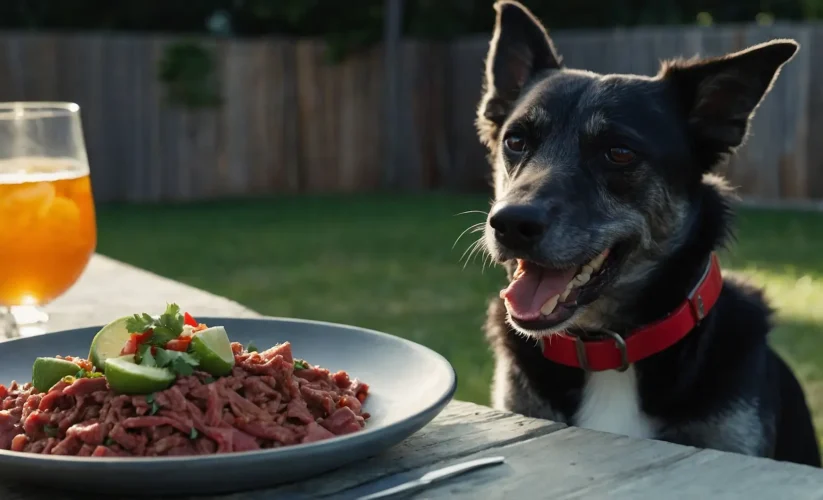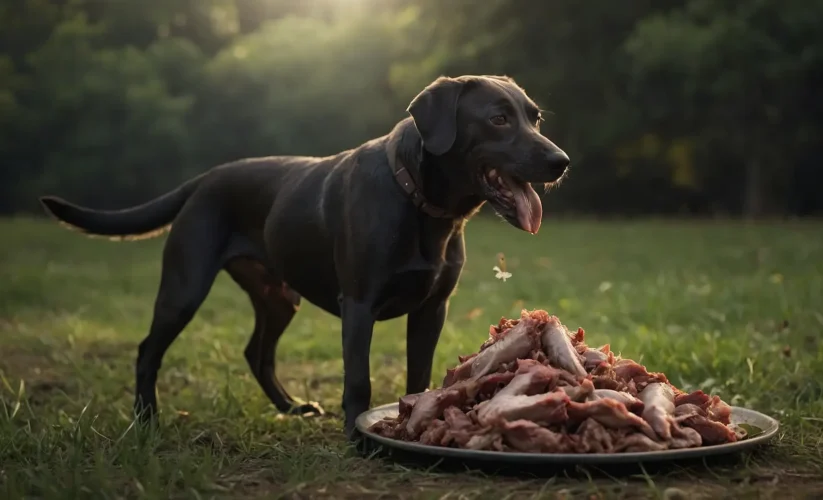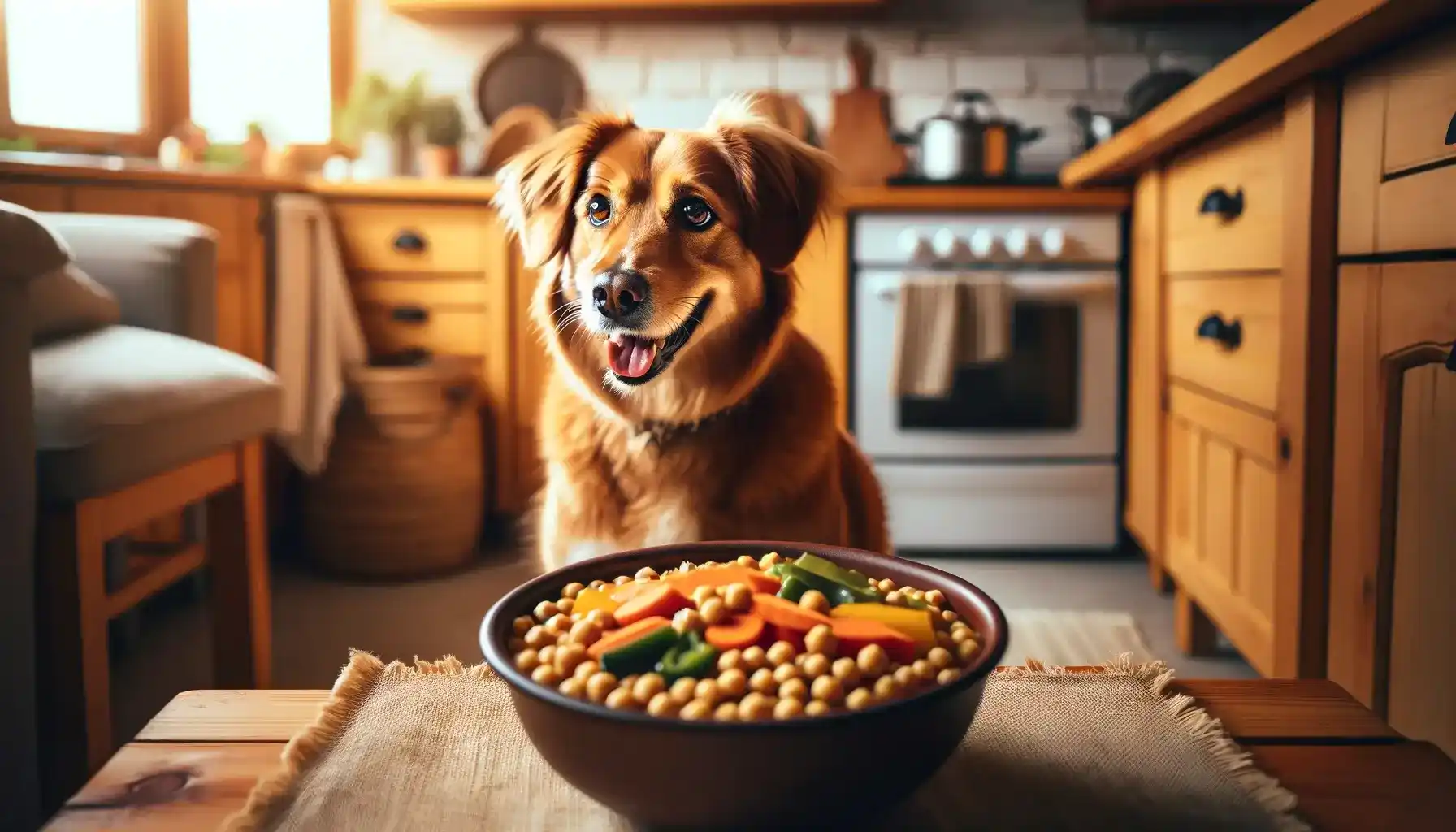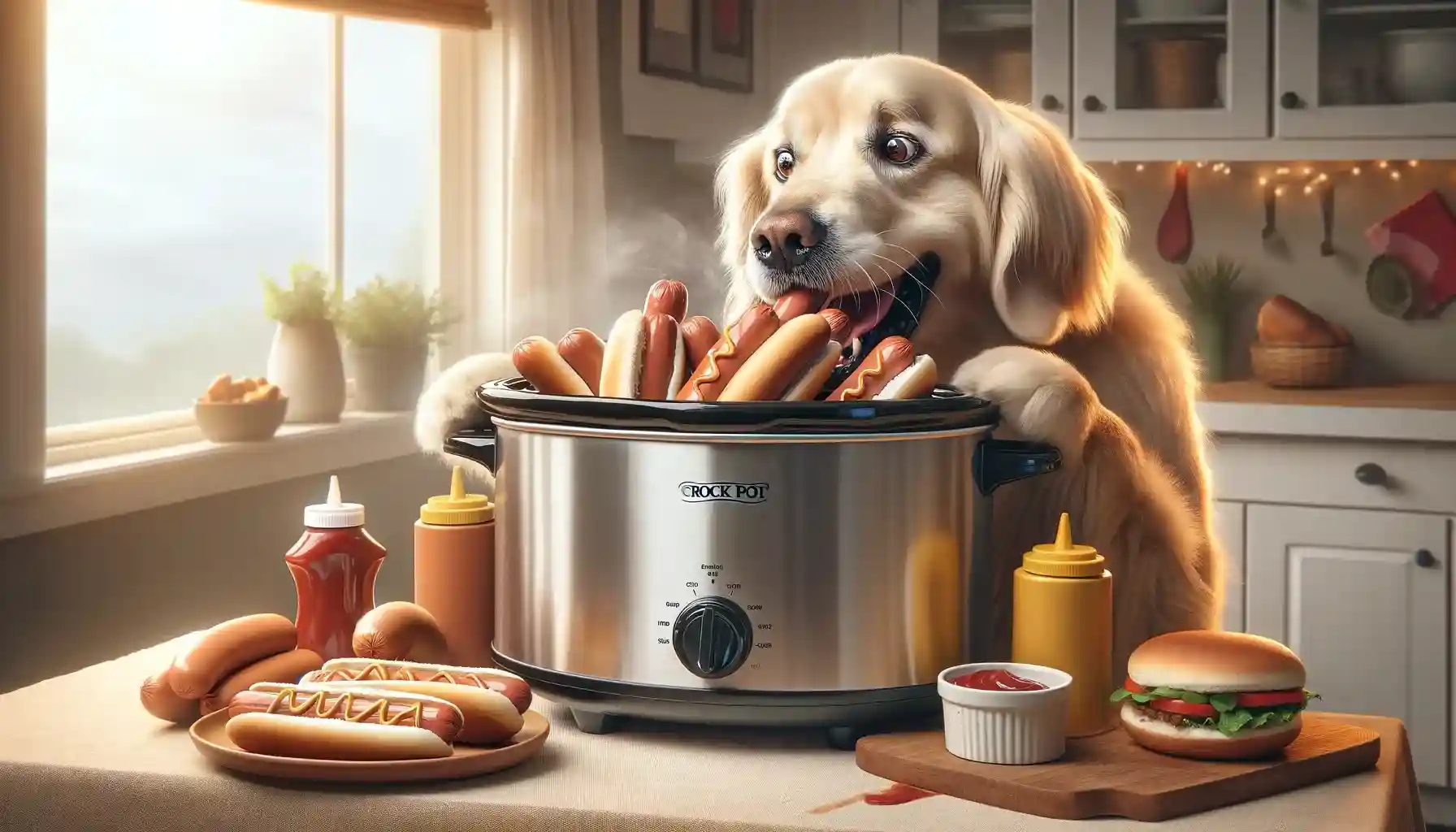Dog Cancer Diet Recipe
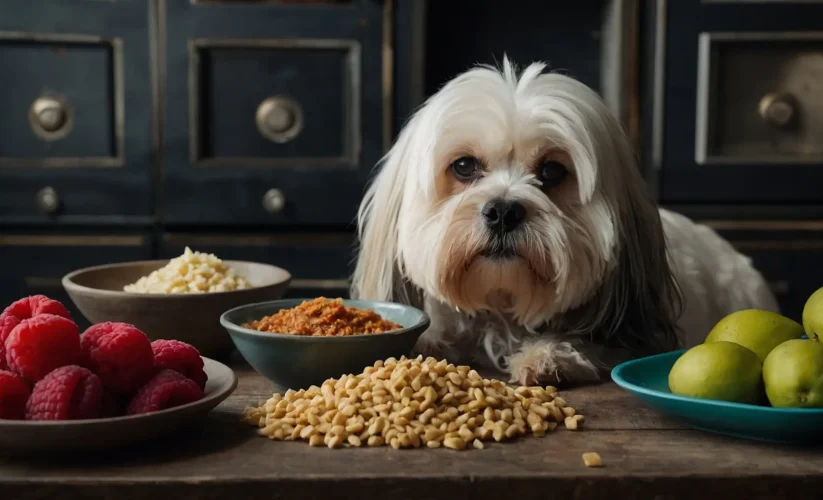
Understanding Dog Cancer and Its Impact on Canine Health
When we talk about cancer in dogs, we’re delving into one of the most challenging diagnoses pet owners can face. This disease is not just a single condition but a complex array of disorders that manifest through the uncontrolled growth and spread of cells in the body. The impact of cancer on a dog’s health can be profound, affecting not just their physical well-being but their behavior and quality of life as well. Integrating a Dog Cancer Diet Recipe into their daily regimen can play a crucial role in managing the disease, offering a beacon of hope for improving their condition and enhancing their overall health.
Cancer can take many forms in dogs, just as it does in humans. It might present as a lump or tumor that can be seen or felt, or it might affect the body in more insidious ways, targeting the internal organs or the bloodstream and only showing symptoms when the disease has advanced. The effects on canine health can vary widely depending on the type of cancer, its location, and its stage of progression. Common impacts include pain, lethargy, loss of appetite, and other symptoms that diminish a dog’s ability to enjoy life.
One of the most distressing aspects of cancer in dogs is how it can suddenly change the dynamic between pets and their owners. The playful energy that once defined a dog’s personality might give way to fatigue and discomfort, and the dietary needs of a dog with cancer can become complex and demanding. Owners may find themselves struggling to adapt to their pet’s changing needs while coping with the emotional toll of the diagnosis.
From a physiological standpoint, cancer affects dogs by disrupting normal cell functions. Healthy cells grow, divide, and die in a controlled way, but cancerous cells break free from this regulated cycle, growing uncontrollably and invading other tissues. This can lead to the formation of tumors, which can impair the function of vital organs, interfere with the body’s normal processes, and, if left unchecked, spread throughout the body in a process known as metastasis.
The traditional approach to treating cancer in dogs often involves a combination of surgery, chemotherapy, and radiation therapy, each with its own set of challenges and side effects. These treatments aim to remove or kill cancerous cells, but they can also take a significant toll on a dog’s body, leading to further complications and a need for supportive care to maintain quality of life.
In recent years, there’s been a growing interest in the role of diet and nutrition in supporting dogs with cancer. The idea is not to replace traditional treatments but to complement them with dietary choices that support the dog’s overall health, boost their immune system, and help them better tolerate the side effects of cancer treatments. This includes focusing on high-quality proteins, healthy fats, and antioxidants, while minimizing exposure to processed foods and carbohydrates that can fuel cancer growth.
Understanding dog cancer and its impact on canine health is the first step in navigating this challenging journey. It’s a diagnosis that requires a multifaceted approach, combining medical treatment with supportive care and nutritional management to improve the dog’s quality of life. For pet owners, it’s a path marked by challenges, but also by the opportunity to deepen the bond with their beloved companion, offering them comfort and care through every stage of their treatment.
The Prevalence and Types of Cancer in Dogs
With cancer being a leading cause of death in dogs, especially in their senior years, understanding the types of cancer that commonly affect dogs is crucial. From lymphoma to osteosarcoma, this part will explore the symptoms, treatments, and prognoses associated with each type, emphasizing the importance of a tailored approach to care.
Symptoms and Diagnosis of Cancer in Dogs
When it comes to battling cancer in our canine friends, early detection is a crucial factor that can significantly influence treatment outcomes. As a responsible pet owner, being vigilant and aware of the early warning signs of cancer can make a profound difference in your dog’s health and quality of life. Here’s what you need to know about identifying potential symptoms and the process of getting a diagnosis.
Recognizing the Symptoms
Cancer symptoms in dogs can vary widely depending on the type of cancer, its location, and how advanced it is. However, there are several common signs that should prompt immediate concern and a visit to the vet:
- Unusual Lumps or Swellings: Any new lump or swelling that persists or continues to grow over time warrants examination. Not all lumps are cancerous, but only a vet can determine the cause.
- Sores that Do Not Heal: Sores that don’t heal could indicate an infection, skin disease, or cancer.
- Weight Loss: Unexplained weight loss, especially when your dog is eating normally, can be a sign of cancer.
- Loss of Appetite: A sudden disinterest in food is a concern, especially if your dog usually has a healthy appetite.
- Bleeding or Discharge: Any unexplained bleeding, or discharge from any body opening, is not normal and should be checked out.
- Offensive Odor: An unusual bad odor from the mouth, nose, or anal area may be a warning sign.
- Difficulty Eating or Swallowing: This can be a sign of cancers of the mouth or neck.
- Lethargy or Decreased Stamina: A noticeable decrease in energy or stamina could indicate an underlying health issue, including cancer.
- Persistent Lameness or Stiffness: For bone cancers, like osteosarcoma, lameness or stiffness can be an early sign.
The Diagnostic Process
If your dog shows any of these symptoms, the next step is a thorough examination by a veterinarian. The vet may recommend a series of tests to confirm the presence of cancer and identify its type and stage. These tests may include:
- Blood Work: To check for signs of infection, anemia, or other conditions that can indicate cancer.
- Urinalysis: To evaluate kidney function and check for urinary tract infections or other issues.
- Imaging: X-rays, ultrasounds, MRIs, or CT scans can help visualize tumors and determine if cancer has spread.
- Biopsy: Taking a sample of tissue from a lump or organ can provide a definitive diagnosis. This may be done through needle aspiration, endoscopy, or surgical biopsy.
- Cytology: Examining cells from a lump or fluid can often help diagnose cancer.
The diagnostic process can be quick or may require several steps, depending on the complexity of the case. It’s a critical phase where you, as a pet owner, need to work closely with your vet to understand the options and implications of the findings.
Early detection and prompt action are your best strategies in the fight against cancer. Knowing the symptoms to watch for and understanding the diagnostic process can empower you as a dog owner to take swift and informed action, potentially saving your dog’s life or significantly improving their quality of life during and after cancer treatment.
The Role of a Dog Cancer Diet in Providing Relief and Extending Lifespan
When facing the daunting reality of cancer in a beloved dog, many pet owners seek every possible avenue to provide relief and extend their pet’s lifespan. Nutrition plays a critical role in this journey. A thoughtfully tailored diet can significantly impact a dog’s ability to cope with the disease and the side effects of treatments such as chemotherapy and radiation.
A diet rich in specific nutrients can bolster the immune system, help mitigate the adverse effects of cancer treatments, and even slow the progression of the disease. The goal is to create meals that not only nourish but also support the dog’s overall well-being, focusing on high-quality, easily digestible foods that cater to the unique needs of a canine battling cancer.
How Can Following a Diet for Dog With Cancer Help Your Pet?
A specialized diet for a dog with cancer focuses on several key areas to support their health and combat the disease:
- Enhanced Nutritional Support: Cancer and its treatments can lead to cachexia (muscle and weight loss) in dogs. A diet high in quality proteins and fats can help maintain body weight and muscle mass, providing the energy needed for recovery and healing.
- Immune System Boost: Ingredients rich in antioxidants (such as vitamins A, C, E, and selenium) can strengthen the immune system. A robust immune system is better equipped to fight cancer and cope with the stress of treatments.
- Reduced Inflammation: Chronic inflammation can support tumor growth. Diets high in omega-3 fatty acids (like those found in fish oil) have anti-inflammatory properties, which can help reduce this risk and alleviate some cancer symptoms.
- Detoxification Support: Certain foods can support liver and kidney function, helping to detoxify the body and eliminate waste products more efficiently, which is especially important during cancer treatment.
Understanding the Limitations of a Dog Cancer Diet
While the benefits of a cancer-specific diet for dogs are clear, it’s crucial to acknowledge its limitations. Nutrition is a powerful tool in the fight against cancer, but it is not a standalone cure. The effectiveness of a diet can vary from one dog to another, depending on various factors including the type and stage of cancer, the dog’s overall health, and the treatments they are undergoing.
It’s essential to view a specialized diet as part of an integrated approach to cancer care, which may also include surgery, chemotherapy, radiation, and other treatments recommended by your veterinarian. Consulting with a veterinary nutritionist can ensure the diet is appropriately tailored to your dog’s specific needs, offering the best possible support alongside conventional treatments.
So, What is the Best Homemade Food for Dogs with Cancer?
Crafting the best homemade food for a dog with cancer involves focusing on nutrient-rich, easily digestible ingredients that support health and combat the effects of the disease. Here are some guidelines:
- High-Quality Protein: Lean meats like chicken, turkey, and fish provide the amino acids needed for muscle maintenance and repair. Cooking these proteins makes them easier for your dog to digest.
- Healthy Fats: Omega-3 fatty acids, found in fish oil and flaxseed oil, offer anti-inflammatory benefits. Coconut oil is another good source of medium-chain fatty acids, which are easily metabolized for energy.
- Antioxidant-Rich Vegetables: Dark, leafy greens (like spinach and kale) and brightly colored vegetables (such as carrots and sweet potatoes) are high in antioxidants. Lightly cooking these vegetables can make them more digestible.
- Avoid Simple Carbohydrates: Cancer cells feed on glucose, so limiting simple sugars and opting for complex carbohydrates like those in vegetables can be beneficial.
- Supplements: Depending on your dog’s specific needs, supplements such as fish oil, probiotics, and specialized vitamins might be recommended by your vet or a veterinary nutritionist.
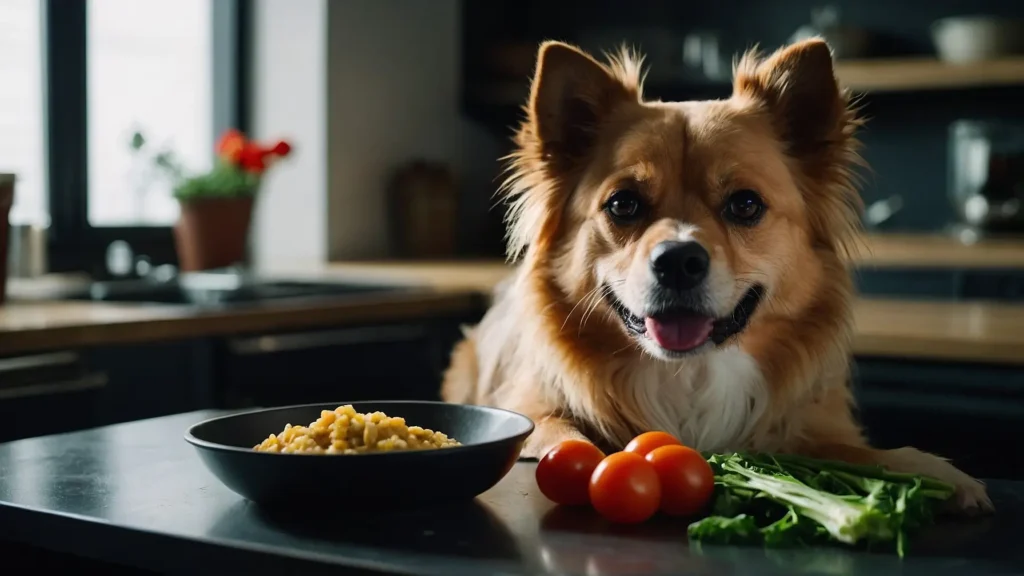
Every dog is unique, and their diet should be tailored to their specific situation. Collaboration with your veterinarian or a veterinary nutritionist is essential to create a balanced, supportive diet plan for your dog with cancer, ensuring it meets all their nutritional needs while fighting the disease.
What to Look for in a Canine Cancer Diet: Nutritional Requirements, Foods to Avoid/Include, and More
Crafting a diet for a dog with cancer is a delicate balancing act that requires a deep understanding of nutritional science and how different foods can either support or hinder a dog’s battle with cancer. Knowing what to include and what to avoid is crucial for optimizing the diet to support your pet’s health and well-being. Here’s a comprehensive look at the nutritional requirements for dogs with cancer, along with foods to prioritize and those to avoid.
Nutritional Requirements for Dogs with Cancer
High-Quality Protein: Protein is the cornerstone of a cancer-fighting diet for dogs. It supports tissue repair, maintains muscle mass, and strengthens the immune system. Opt for high-quality, easily digestible sources like lean chicken, turkey, beef, and fish. The cooking process should aim to preserve nutrients while making the food easy for your dog to digest.
Essential Fatty Acids: Omega-3 fatty acids, found in fish oil, flaxseed, and chia seeds, are known for their anti-inflammatory properties. They can help counteract the inflammation associated with cancer and may inhibit tumor growth. These fats are also crucial for maintaining a healthy coat and skin.
Antioxidants: Foods rich in antioxidants can help combat oxidative stress and may reduce the side effects of cancer treatments. Vitamins A, C, E, and minerals like selenium and zinc play significant roles. Include fruits and vegetables like blueberries, carrots, and leafy greens, but always in moderation to avoid excessive sugar intake.
Fiber: A moderate amount of fiber is beneficial for supporting digestive health, especially as some cancer treatments can disrupt gut function. Sources of fiber like pumpkin and sweet potato can also provide essential vitamins and help maintain stable blood sugar levels.
Foods to Include
Lean Proteins: As mentioned, proteins are vital. Focus on sources that are low in fat and high in quality, such as chicken breast, turkey, and fish like salmon, which also provides omega-3 fatty acids.
Vegetables: Non-starchy vegetables are excellent sources of vitamins, minerals, and fiber. Incorporate a variety of colors to ensure a range of nutrients. Steaming or pureeing can make them easier to digest.
Healthy Fats: In addition to omega-3s, medium-chain triglycerides (MCTs) found in coconut oil can be a good energy source and may have anti-cancer properties.
Foods to Avoid
High-Fat Meats: While fats are essential, high-fat meats can be hard to digest and may contribute to discomfort, especially in dogs with certain types of cancer or those undergoing specific treatments.
Simple Carbohydrates: Sugars and simple carbs can feed cancer cells and cause spikes in blood sugar. Limit or avoid foods high in simple sugars and opt for complex carbohydrates found in vegetables.
Processed Foods: Preservatives, artificial colors, and flavors in processed foods can add unnecessary chemicals and toxins that a dog’s body doesn’t need, especially when fighting cancer.
Additional Considerations
Hydration: Ensure your dog stays well-hydrated. Cancer and its treatments can lead to dehydration, so fresh, clean water should always be available.
Portion Control: Managing your dog’s weight is crucial. Obesity can exacerbate health problems, while underfeeding can lead to muscle wasting. Work with your vet to determine the right portion sizes based on your dog’s size, age, and activity level.
Supplements: Some dogs may benefit from supplements, but it’s essential to consult with a veterinarian before adding any to your dog’s diet. They can recommend specific supplements that may support your dog’s health, such as probiotics, digestive enzymes, or additional vitamins and minerals.
Crafting a diet for a dog with cancer involves careful consideration of their unique nutritional needs and how certain foods can support or impede their health. It’s a collaborative effort that should involve input from veterinary professionals to ensure the diet is both safe and effective in supporting your dog’s fight against cancer.
Should You Create Your Own Dog Cancer Diet Recipe or Buy Pre-Formulated Meals?
The decision between homemade diets and pre-formulated meals is significant. This section will compare the benefits and challenges of each option, offering advice on how to choose the best route for your dog, including considerations for time, cost, and nutritional completeness.
The Best Dog Food for Cancer at Chi Dog: Feed Your Pet the Metal Diet or Earth Diet to Improve Quality of Life
Drawing inspiration from traditional diets and modern nutritional science, this part will explore how principles from diets like the Metal and Earth diets can be adapted for homemade feeding. It will provide examples of meal plans and ingredients that align with these principles, tailored for dogs with cancer.
Tips for Ensuring a Smooth Transition Into Your Dog’s Diet
Switching to a new diet can be challenging for both dog and owner. This section will offer practical tips for gradually introducing new foods, monitoring your dog’s response, and making adjustments as needed to ensure the transition is as smooth and stress-free as possible.
Aside From Feeding the Best Dog Food for Cancer, Here’s How to Provide Relief and Extend the Lifespan
Comprehensive care for a dog with cancer extends beyond diet. This part will touch on the importance of regular veterinary check-ups, exercise tailored to your dog’s abilities, and mental stimulation to maintain their quality of life during cancer treatment.
Parting Thoughts on the Best Diet for Dog With Cancer
Concluding the post, this section will reflect on the journey of caring for a dog with cancer, emphasizing the power of love, commitment, and informed care in enhancing their lives. It will encourage owners to work closely with their vets, seek support when needed, and cherish every moment with their beloved pets.

